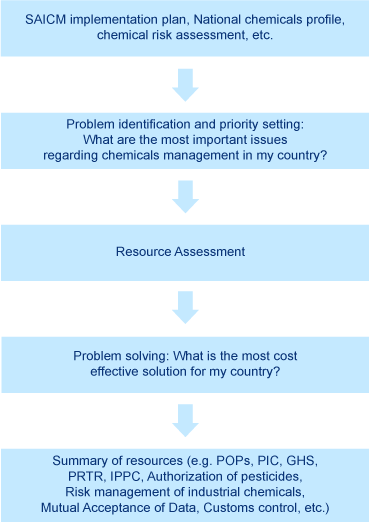|
The IOMC, established in 1995, is supported by 9 Participating Organizations (POs),
with the aim to strengthen cooperation and increase coordination in the field of chemical
safety in relation to human health and the environment. The 9 POs are the Food and Agriculture
Organization of the United Nations (FAO), the International Labour Organization (ILO), the
United Nations Development Programme (UNDP), the United Nations Environment Programme (UNEP),
the United Nations Industrial Development Organization (UNIDO), the United Nations Institute
for Training and Research (UNITAR), the World Health Organization (WHO), the World Bank, and
the Organisation for Economic Co-operation and Development (OECD). The Inter-Organization
Coordinating Committee (IOCC) is the IOMC secretariat. The IOMC works on subjects related to
chemical safety, especially those elaborated in Chapter 19 of Agenda 21 and which are now
covered by the Strategic Approach to International Chemicals Management (SAICM) Global Plan of
Action, consisting of Risk Reduction, Knowledge and Information, Governance, Capacity Building
and Technical Cooperation, and Illegal Traffic.
The main strategies of IOMC include:
- Strengthening capacities in chemicals management and implementation;
- Strengthening capacities in knowledge and information on chemicals;
- Improving policy and legislation, such as those addressing the illegal movements of
hazardous compounds;
- Strengthening capacities for programmes that are related to chemicals management; and
- Increasing capacities to monitor and evaluate chemicals management.
The vision statement of IOMC is to be the pre-eminent mechanism for initiating,
facilitating and coordinating international action to achieve the goal agreed at the 2002
Johannesburg World Summit on Sustainable Development of ensuring that, "by the year 2020,
chemicals are produced and used in ways that minimize significant adverse impacts on the
environment and human health". The IOMC has carried out a number of successful
joint-activities that support countries in implementing the Conventions, such as:
- Supporting countries to implement the Stockholm Convention on Persistent Organic
Substances (POPs) and to develop their National Implementation Plan (NIPs);
- Supporting countries to implement the Rotterdam Convention on the Prior Informed
Consent (PIC) Procedure for Certain Hazardous Chemicals and Pesticides in
International Trade, through the Secretariat provided jointly by FAO and UNEP in
Rome and Geneva;
- Supporting establishment and implementation of the Globally Harmonized System for the
Classification and Labeling of Chemicals (GHS), in the area of health and
environmental hazards;
- Addressing the problems of obsolete pesticides in Africa, by building capacity in
countries for prevention, management and disposal of obsolete pesticides;
- Assessing existing chemicals, through sharing the burden of information gathering,
testing, assessment of High Production Volume Chemicals among OECD countries and
identifying the needs for further work on chemicals;
- Developing guidance on, and promotion of Pollutant Release and Transfer Registers
(PRTRs) as well as Release Estimation Techniques (RETs); and
- Preparation of the document, "National Implementation of SAICM: A Guide to Resource,
Guidance, and Training Materials of IOMC Participating Organizations and the IOMC
Strategy for Strengthening National Chemicals Management Capacities".
IOMC is currently developing a web-based problem-solving tool, i.e. a
"Toolbox for Decision-Making in Chemicals Management". The IOMC Toolbox will be a problem
identification and problem-solving tool that assists countries to identify available IOMC
resources that could provide assistance. This could help to address specific national
chemicals management issues and will take into account, when possible, all materials
developed by the IOMC Participating Organisations. A proof-of-concept version of the
toolbox was presented at the 3rd ICCM in Nairobi.
 Concept of IOMC Toolbox for Decision Making in Chemicals Management
Concept of IOMC Toolbox for Decision Making in Chemicals Management
For more detailed information on the IOMC, please visit
http://www.who.int/iomc/en/index.html.
|


